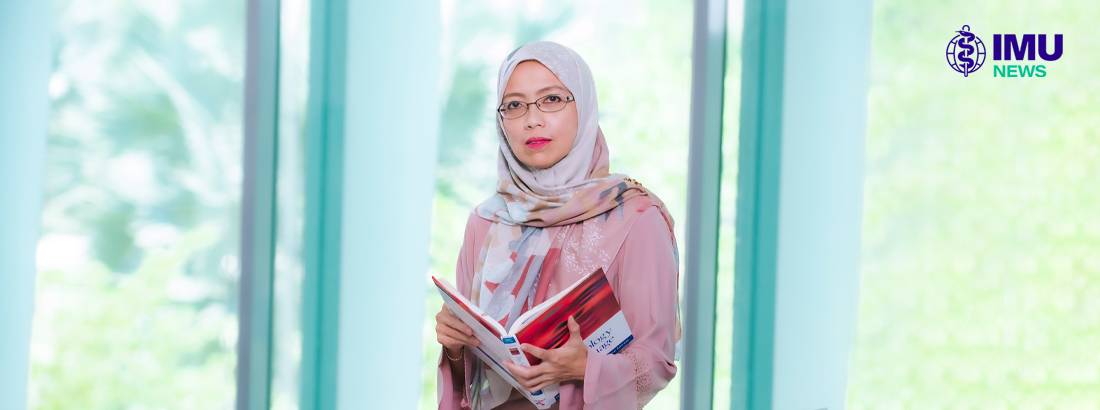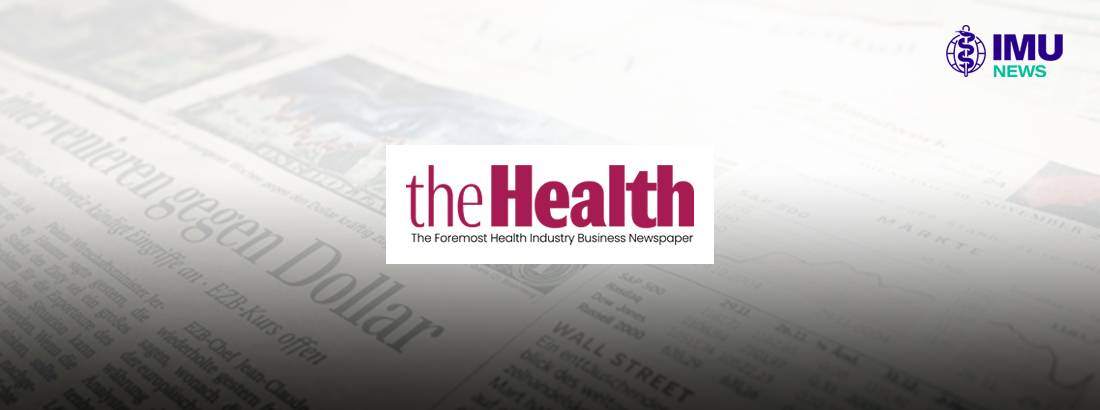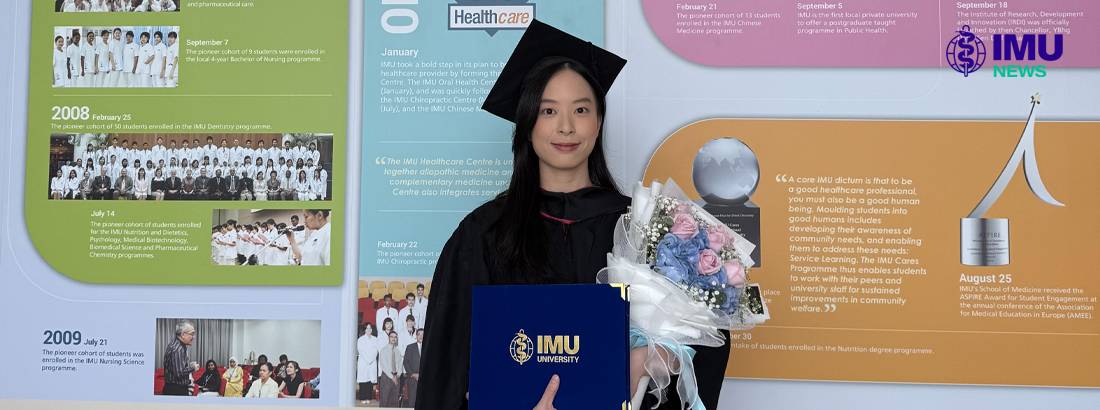How do we ensure that medical professionals can bring real change and continue to be of service to the people around them? Medicine is so much more than learning to diagnose and treat patients, says Prof Sharifah Sulaiha Binti Syed Aznal, Dean, School of Medicine at the IMU. Here she tells us more about her vision for her students and graduates of the school.
Skills can be learnt, knowledge can be gained, but it is what lies beyond this – the inculcation of values, attitudes and mindsets – that gives graduates the best chance to bring positive impact to the diverse patients and communities they will serve. “It is always intriguing to see my young students and doctors achieve phenomenal success in their journey to help improve our healthcare system,” says Prof Sulaiha.
It has been a lifelong passion for her to play a part in developing a well-educated and healthy nation – and being at the IMU has given her that opportunity. As Dean of the IMU School of Medicine (SOM), she continues to strengthen a robust learning framework that challenges students to think like doctors from the moment they step into their respective programmes.
The current medical curriculum, introduced in 2021, has cemented competency-based education at the school by emphasising mastery of skills and knowledge based on key clinical problems. With it, students have found better opportunities to apply what they learn in a way that is meaningful, practical and, most importantly, relevant to today’s health challenges. It allows students to develop the mindset of a doctor from the very beginning of their studies.
“We need to be bold in focusing beyond the traditional education system and practice,” says Prof Sulaiha. She explains that the faculty works closely with industries and communities to ensure that they are always up to date and understand society’s current needs.
The SOM’s curriculum has been called tough by others, challenging students and faculty alike to continually bridge the gap between lecture-hall theories and real-world challenges and solutions. It is this brand of medical education that gives IMU graduates the confidence to always be a step ahead when they graduate.
Thinking Out of the Medical Box
Today’s healthcare needs are demanding and complicated. A single-discipline approach is no longer adequate or desirable. Prof Sulaiha explains that interdisciplinary collaborations are no longer just opportunities to be sought, but rather part of the essential framework to ensure students embody a wholistic view.
At the IMU, the different schools work together to integrate the diverse facets of the various health professions. On one end of the spectrum, the SOM works closely with the dietetics and nutrition faculty to give medical students a more in-depth knowledge about primary prevention of diseases. On the other end, it works with the business faculty – incorporating a module on entrepreneurship within the medical programme which includes a visit to privately-run clinics to gain a business perspective.
“Students benefit from thinking outside the mind of a medical person,” says Prof Sulaiha, adding that she wants students to see that healthcare is wider than just working in hospitals. This is why at the SOM, students are given as much exposure to internships, placements, and other industry collaborations, not just in healthcare but in related fields such as at pharmaceutical companies and medical law firms.
Bringing Things Together under One Health
On a broader level, the SOM is working closely with other experts to develop programmes that will allow the school to embrace the inclusion of human, animal and environmental health. Work is already underway to develop the bio-veterinary science programme; and according to Prof Sulaiha, the school is also exploring programmes that will contribute towards better public and environmental health through a Bachelor of Public Health and Bachelor of Occupational Safety and Environmental Health.
These are all components that support the university’s direction towards the One Health concept – that we not only live alongside nature and the animal kingdom but are affected by these elements of the world just as we affect them.
Multi-tiered Support
Perhaps one of the most telling testimonies of the SOM is the willingness of its alumni to return as part of a support system for current students struggling academically. The alumni coaching programme was launched in early 2023 and the response has been good – students appreciate the extra support and alumni have been eager to join the programme.
The school also runs a peer tutoring initiative where senior students, waiting for transfers to their respective partner schools, help junior students with clinical skills. “Peer tutoring is a formal programme and tutors are trained before they can take up the posts,” explains Prof Sulaiha. True to the innovative nature of the school, alumni of the programme have even started to revamp and innovate the delivery of the programme themselves.
Students at the SOM also benefit from having a solid faculty to back them up. “We have members with different expertise who hold various types of recognition,” says Prof Sulaiha. Some faculty members are currently listed in the top two per cent of world recognised scientists. Others hold high positions in local and international societies and associations such as Mercy Malaysia and Doctors without Borders. “They assist in opening doors for networking and providing opportunities to staff and students in flourishing existing skills or pursuing future careers,” says Prof Sulaiha.
If It’s not Broken, Evolve It
Led by a dean who believes in staying dynamic, the SOM is not about fixing things that are broken, but rather growing from strength to strength. “We need to keep innovating and evolving. We need to keep it interesting and exciting for students and for ourselves,” says Prof Sulaiha.
Key to this constant progress is making students not just the end consumer, but partners in their own learning. “We partner with students to come up with new ideas,” says Prof Sulaiha, explaining that these new ideas are then taken on as projects in the school.
Some significant student-initiated projects in the past have been the setting up of InciSion Malaysia, the local chapter of the International Student Surgical Network – an international non-profit organisation for medical and public health students, residents, and young doctors in the field of global surgery. “It is run by students of other universities now, but the initiators of the project were our students,” says Prof Sulaiha proudly.
IMU students have also been active in promoting global health education – working with the Academy of Medicine to come up with annual symposiums; and with the United Nations University on global health campaigns with some students volunteering and working part time at the UN.
Going Beyond
All of this, Prof Sulaiha says, is a way to ensure that students know that being a doctor is going beyond what they thought they would be doing: “It is beyond making diagnoses and treating patients, beyond performing surgeries. It is about being involved in your community to improve your society,” she says stressing that her personal vision for the School of Medicine is to nurture healthcare professionals who are passionate advocates for equitable, sustainable, and innovative healthcare systems globally.
She hopes that the years spent at the SOM will inculcate the appropriate attitudes in students: to be adaptive, humble, respectful, independent, selfless, confident, trustworthy, reliable, and progressive – everything they need to be sought-after practitioners.
Her challenge to her students: “Be inspired to be the best individual you can be in your chosen field. Make a difference and bring positive change that will help the nation and the people.”
About Prof Sulaiha
Prof Sulaiha specialises in obstetrics and gynaecology with a special interest in urogynaecology and women’s sexual and reproductive health. She has been in the field for the last 25 years. She is also passionate about medical education and since 2004, she has been actively involved in undergraduate and postgraduate training.
She loves challenges, appreciates innovation and is a strong believer of dynamism and achieving goals. Her years as a clinician, who has often been caught in emergency situations, has trained her to make fast and firm decisions, to be resourceful, tactful and innovative.
She was appointed Dean of the IMU School of Medicine in January 2023 and accepted the position as she strongly believes in the university’s vision to develop students to reach their true potential in becoming competent, ethical, caring and inquiring citizens and visionary leaders.
“It is my obligation to give back to the society through this institution that I have learnt to trust and love after more than 15 years of working together. I am grateful to have a team of incredibly talented people to work with me in bringing the school to greater heights.”






No approved comments.